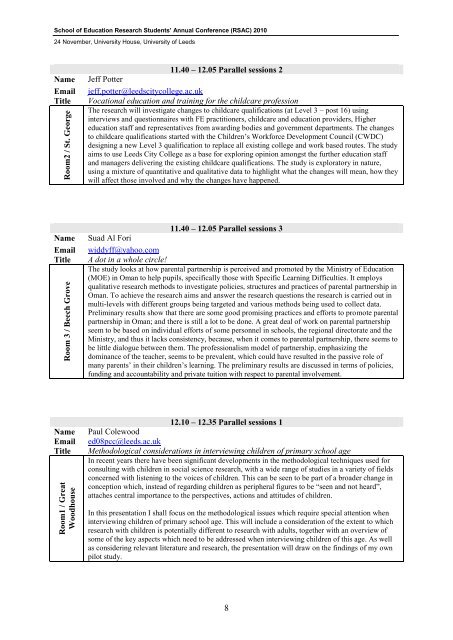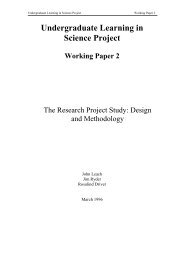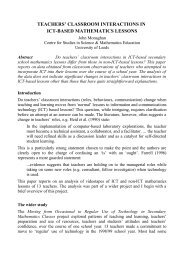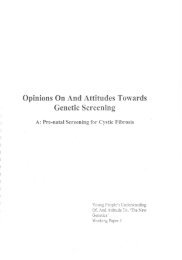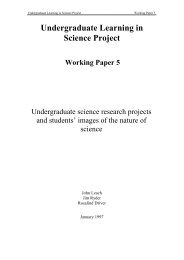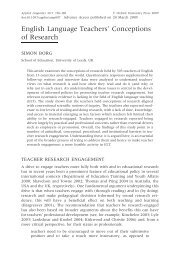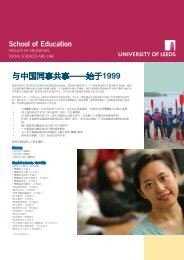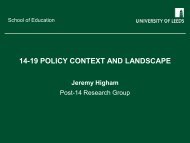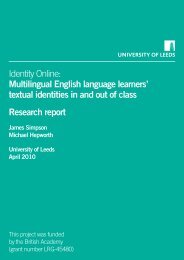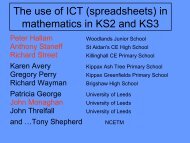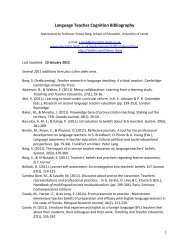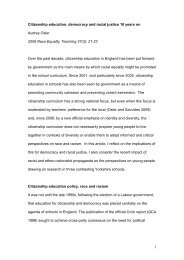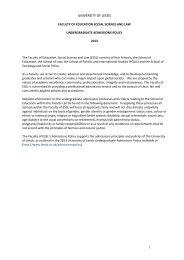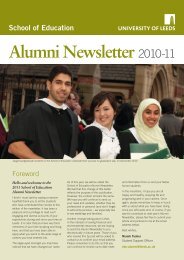Research Students' Annual Conference (RSAC) 2010 - School of ...
Research Students' Annual Conference (RSAC) 2010 - School of ...
Research Students' Annual Conference (RSAC) 2010 - School of ...
You also want an ePaper? Increase the reach of your titles
YUMPU automatically turns print PDFs into web optimized ePapers that Google loves.
Room1 / Great<br />
Woodhouse<br />
Room 3 / Beech Grove<br />
Room2 / St. George<br />
<strong>School</strong> <strong>of</strong> Education <strong>Research</strong> Students’ <strong>Annual</strong> <strong>Conference</strong> (<strong>RSAC</strong>) <strong>2010</strong><br />
24 November, University House, University <strong>of</strong> Leeds<br />
Name<br />
Email<br />
Title<br />
11.40 – 12.05 Parallel sessions 2<br />
Jeff Potter<br />
jeff.potter@leedscitycollege.ac.uk<br />
Vocational education and training for the childcare pr<strong>of</strong>ession<br />
The research will investigate changes to childcare qualifications (at Level 3 – post 16) using<br />
interviews and questionnaires with FE practitioners, childcare and education providers, Higher<br />
education staff and representatives from awarding bodies and government departments. The changes<br />
to childcare qualifications started with the Children‘s Workforce Development Council (CWDC)<br />
designing a new Level 3 qualification to replace all existing college and work based routes. The study<br />
aims to use Leeds City College as a base for exploring opinion amongst the further education staff<br />
and managers delivering the existing childcare qualifications. The study is exploratory in nature,<br />
using a mixture <strong>of</strong> quantitative and qualitative data to highlight what the changes will mean, how they<br />
will affect those involved and why the changes have happened.<br />
Name<br />
Email<br />
Title<br />
11.40 – 12.05 Parallel sessions 3<br />
Suad Al Fori<br />
widdyff@yahoo.com<br />
A dot in a whole circle!<br />
The study looks at how parental partnership is perceived and promoted by the Ministry <strong>of</strong> Education<br />
(MOE) in Oman to help pupils, specifically those with Specific Learning Difficulties. It employs<br />
qualitative research methods to investigate policies, structures and practices <strong>of</strong> parental partnership in<br />
Oman. To achieve the research aims and answer the research questions the research is carried out in<br />
multi-levels with different groups being targeted and various methods being used to collect data.<br />
Preliminary results show that there are some good promising practices and efforts to promote parental<br />
partnership in Oman; and there is still a lot to be done. A great deal <strong>of</strong> work on parental partnership<br />
seem to be based on individual efforts <strong>of</strong> some personnel in schools, the regional directorate and the<br />
Ministry, and thus it lacks consistency, because, when it comes to parental partnership, there seems to<br />
be little dialogue between them. The pr<strong>of</strong>essionalism model <strong>of</strong> partnership, emphasizing the<br />
dominance <strong>of</strong> the teacher, seems to be prevalent, which could have resulted in the passive role <strong>of</strong><br />
many parents‘ in their children‘s learning. The preliminary results are discussed in terms <strong>of</strong> policies,<br />
funding and accountability and private tuition with respect to parental involvement.<br />
Name<br />
Email<br />
Title<br />
12.10 – 12.35 Parallel sessions 1<br />
Paul Colewood<br />
ed08pcc@leeds.ac.uk<br />
Methodological considerations in interviewing children <strong>of</strong> primary school age<br />
In recent years there have been significant developments in the methodological techniques used for<br />
consulting with children in social science research, with a wide range <strong>of</strong> studies in a variety <strong>of</strong> fields<br />
concerned with listening to the voices <strong>of</strong> children. This can be seen to be part <strong>of</strong> a broader change in<br />
conception which, instead <strong>of</strong> regarding children as peripheral figures to be ―seen and not heard‖,<br />
attaches central importance to the perspectives, actions and attitudes <strong>of</strong> children.<br />
In this presentation I shall focus on the methodological issues which require special attention when<br />
interviewing children <strong>of</strong> primary school age. This will include a consideration <strong>of</strong> the extent to which<br />
research with children is potentially different to research with adults, together with an overview <strong>of</strong><br />
some <strong>of</strong> the key aspects which need to be addressed when interviewing children <strong>of</strong> this age. As well<br />
as considering relevant literature and research, the presentation will draw on the findings <strong>of</strong> my own<br />
pilot study.<br />
8


